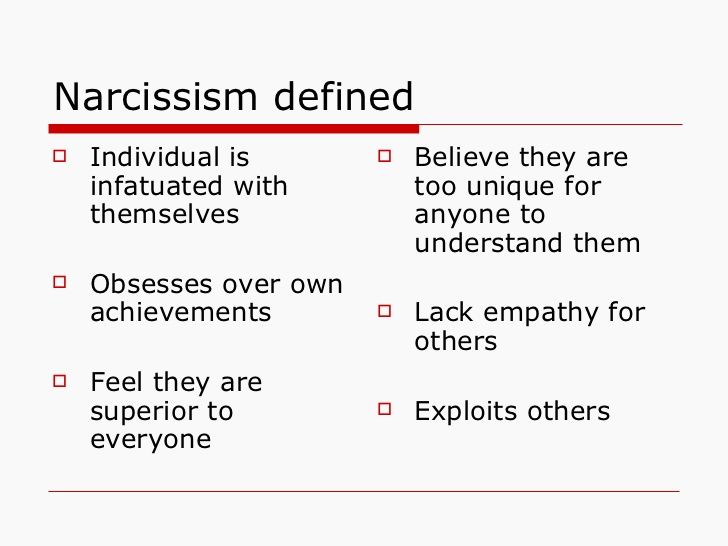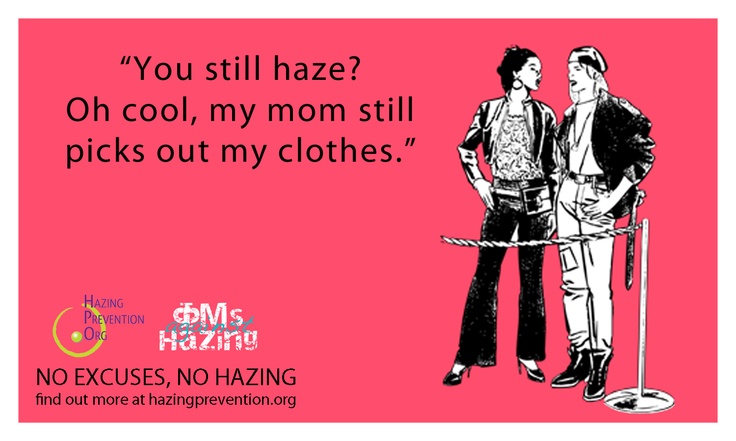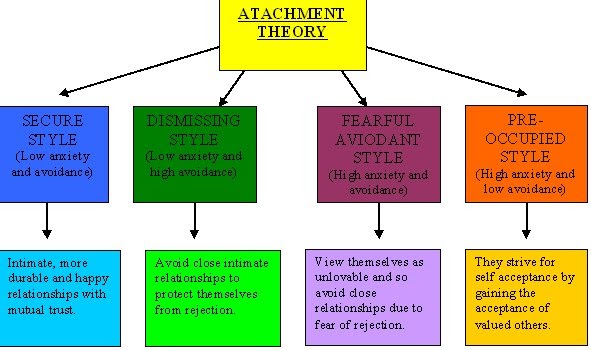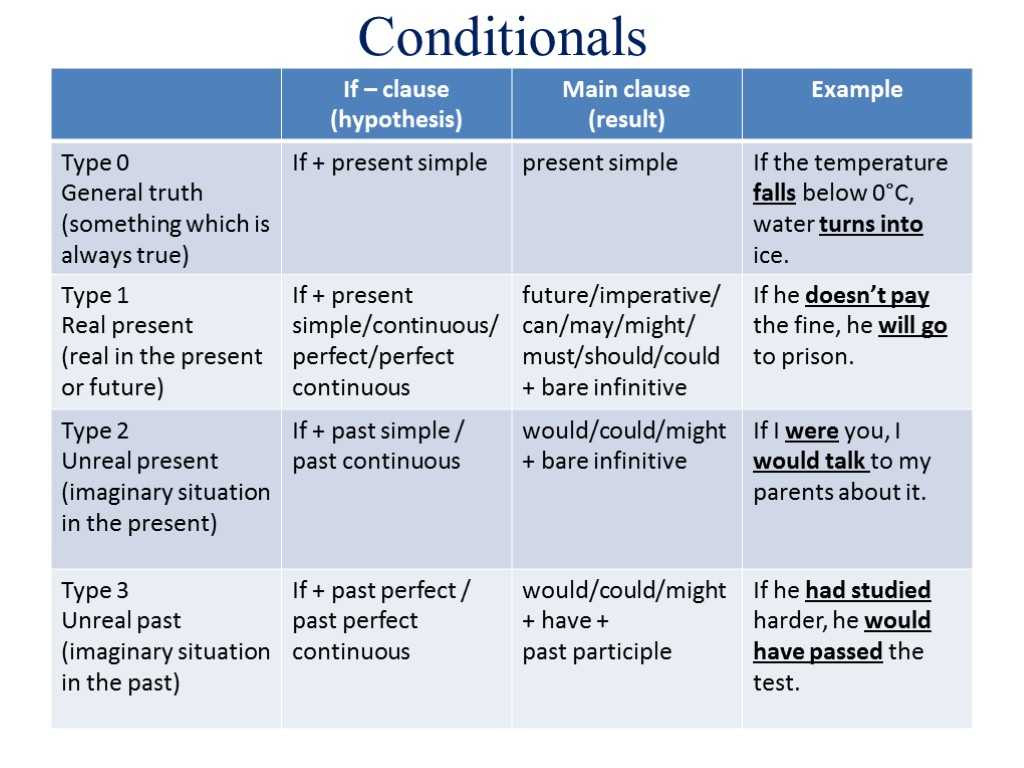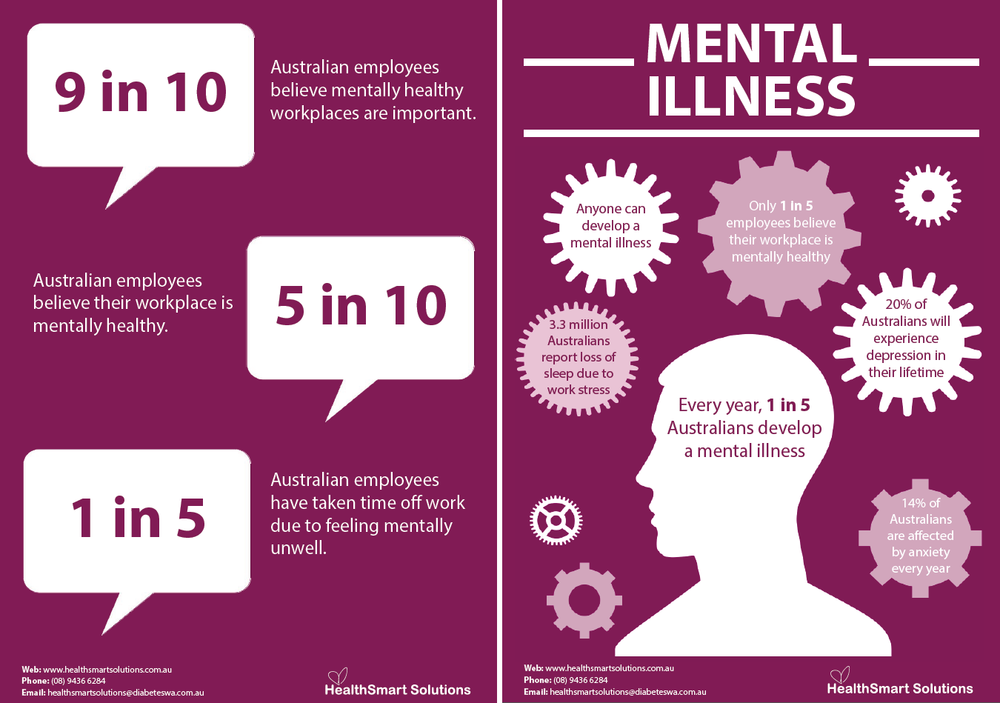Narcissism by proxy
Narcissism By Proxy | HealthyPlace
Question:
Is narcissism "contagious"? Can one "catch" narcissism by being in the presence of a narcissist?
Answer:
The psychiatric profession uses the word: "epidemiology" when it describes the prevalence of psychopathologies. There is some merit in examining the incidence of personality disorders in the general population. Some of them might be genetically induced. Most of them are, probably, influenced by the cultural context of the society in which they occur. But are personality disorders communicable diseases?
The answer is more complex than a simple "yes" or "no". Personality disorders are not contagious in the restricted, rigorous, medical sense. They are not communicated by pathogens from one individual to another. They lack many of the basic features of physical-biological epidemics.
Still, they are communicated.
First, there is the direct, interpersonal, influence.
A casual encounter with a narcissist is likely to leave a bad aftertaste, bewilderment, hurt, or anger. But these transient reactions have no lasting effect and they fade with time. Not so with more prolonged interactions: marriage, partnership, co-existence, cohabitation, working or studying together and the like.
Narcissism brushes off. Our reactions to the narcissist, the initial ridicule, the occasional rage, or the frustration - tend to accumulate and form the sediment of deformity. Gradually, the narcissist distorts the personalities of those he is in constant touch with, casts them in his defective mould, limits them, redirects them, and inhibits them. When sufficiently cloned, the narcissist uses the effected personalities as narcissistic proxies, narcissistic vehicles of vicarious narcissism.
The narcissist provokes in us emotions, which are predominantly negative and unpleasant.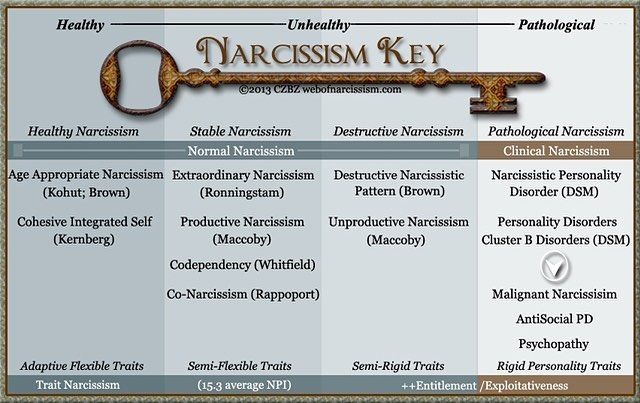 The initial reaction, as we said, is likely to be ridicule. The narcissist, pompous, incredibly self-centred, falsely grandiose, spoiled and strange (even his manner of speech is likely to be constrained and archaic) - often elicits smirks in lieu of admiration.
The initial reaction, as we said, is likely to be ridicule. The narcissist, pompous, incredibly self-centred, falsely grandiose, spoiled and strange (even his manner of speech is likely to be constrained and archaic) - often elicits smirks in lieu of admiration.
But the entertainment value is fast eroded. The narcissist's behaviour becomes tiresome, irksome and cumbersome. Ridicule is supplanted by ire and, then, by anger and by rage. The narcissist's inadequacies are so glaring and his denial and other defence mechanisms so primitive - that we feel like constantly screaming at him, berating, debasing and reproaching him, even to the point of striking at him literally as well as figuratively.
Ashamed at these reactions, we begin to also feel guilty. We find ourselves attached to a mental pendulum, swinging between repulsion and guilt, rage and pity, lack of empathy and remorse. Slowly we acquire the very characteristics of the narcissist that we so deplore.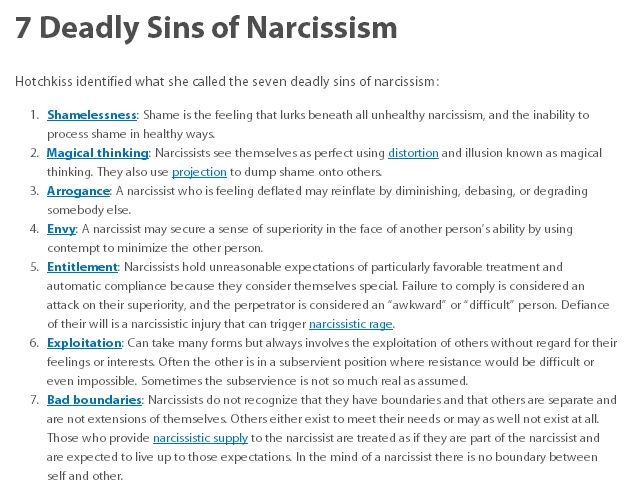 We become as tactless as he is, as devoid of empathy and of consideration, as ignorant of the emotional composition of other people, as one track minded. Bathed in the sick halo of the narcissist - we are "blessed".
We become as tactless as he is, as devoid of empathy and of consideration, as ignorant of the emotional composition of other people, as one track minded. Bathed in the sick halo of the narcissist - we are "blessed".
The narcissist invades our personality. He makes us react the way he would have liked to, had he dared, or had he known how (a mechanism known as "projective identification"). We are exhausted by his eccentricity, by his extravagance, by his grandiosity, by his constant claims.
The narcissist incessantly, adamantly, even aggressively makes demands upon his environment. He is addicted to his Narcissistic Supply: admiration, adoration, approval, attention. He feels entitled. He forces others to lie to him and over-rate his achievements, his talents, his merits. Living in a narcissistic fantasyland, he imposes on his nearest or dearest to join him there, however incommensurate the exercise, either with their personality, or with reality.
The resulting exhaustion, desperation and weakening of the will - are fully taken advantage of by the narcissist. Through these reduced defences he penetrates, and, like a Trojan horse, spews forth his lethal charge. Imitation and emulation of his personality traits by his surroundings are but two of the weapons in his never dwindling, always creative, arsenal. But he does not recoil from using fear and intimidation.
He coerces people around him by making subtle uses of processes such as reinforcement and conditioning. Seeking to avoid the unpleasant consequences of not succumbing to his wishes - people would rather comply with his demands and be subjected to his whims. Not to confront his rages - they "cut corners", pretend, participate in his charade, lie, and become subsumed in his grandiose fantasies.
Rather than be aggressively nagged, they reduce themselves, minimise their personalities, and place themselves in the shadow cast by the narcissist, however small.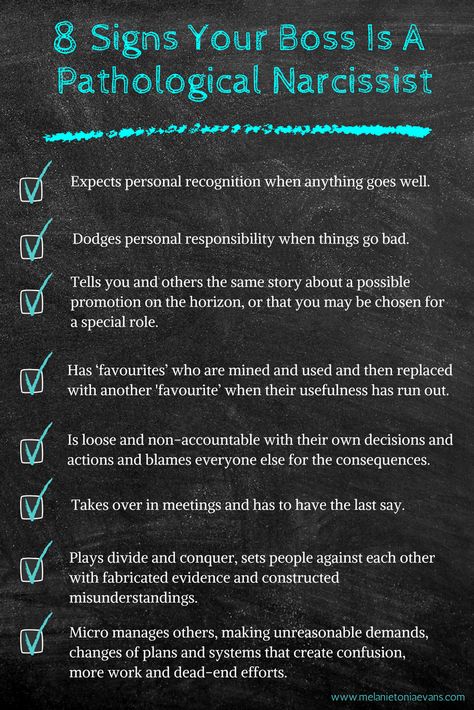 By doing all this - they delude themselves that they have escaped the worst consequences.
By doing all this - they delude themselves that they have escaped the worst consequences.
But the worst is yet to come. The narcissist is confined, constrained, restrained and inhibited by the unique structures of his personality and of his disorder. There are many behaviours which he cannot engage in, many reactions and actions "prohibited", many desires stifled, many fears inhibiting.
The narcissist uses others as an outlet to all these repressed emotions and behaviour patterns. Having invaded their personalities, having altered them by methods of attrition and erosion, having made them compatible with his own disorder, having secured the submission of his victims - he moves on to occupy their shells. Then he makes them do what he always dreamt of doing, what he often desired, what he constantly feared to do.
Using the same compelling methods, he drives his mates, spouse, partners, colleagues, children, or co-workers - into collaborating in the expression of the repressed side of his personality.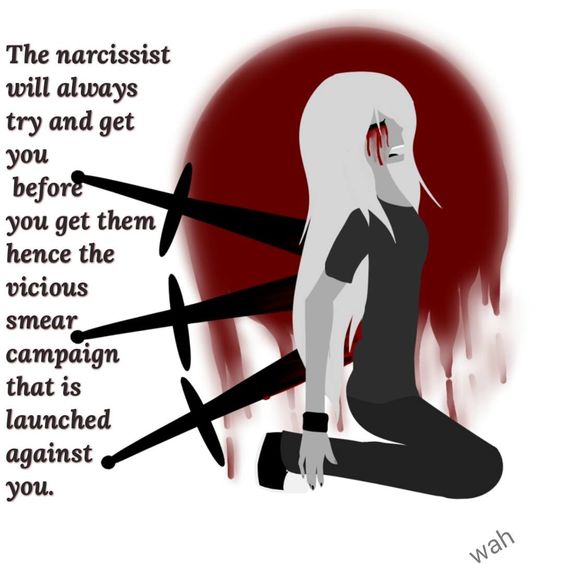 At the same time, he negates the vague sensation that their personality has been substituted by his when committing these acts.
At the same time, he negates the vague sensation that their personality has been substituted by his when committing these acts.
The narcissist can, thus, derive, vicariously, through the lives of others, the Narcissistic Supply that he so needs. He induces in them criminal, romantic, heroic, impulses. He navigates them to forbidden realms of the intellect. He makes them travel far, travel fast, breach all norms, gamble against all odds, fear not - in short: be what he could never be.
And he thrives on the attention, admiration, fascination, or horrified reactions lavished upon his proxies. He consumes the Narcissistic Supply flowing through the human conduits of his own making. Such a narcissist is likely to use sentences like "I made him", "He was nothing before he met me", "He is my creation", "She learned everything she knows from me and at my expense", and so on.
Sufficiently detached - both emotionally and legally - the narcissist flees the scene when the going gets tough. Often, these behaviours, acts and emotions induced by the proximity to the narcissist - bring about harsh consequences. An emotional crisis can be as calamitous as a physical or material catastrophe.
Often, these behaviours, acts and emotions induced by the proximity to the narcissist - bring about harsh consequences. An emotional crisis can be as calamitous as a physical or material catastrophe.
The narcissist's prey is not equipped to deal with the crises that are the narcissist's daily bread and which, now, he or she are forced to confront as the narcissist's proxy. The behaviour and emotions induced by the narcissist are alien and a cognitive dissonance usually ensues. This only aggravates the situation. But the narcissist is rarely there to watch his invaded victims writhe and suffer.
At the first sign of trouble, he flees and disappears. This act of vanishing need not be physical or geographical. The narcissist is better at disappearing emotionally and at evading his legal obligations (despite constant righteous moralising). It is then and there that the people who surround the narcissist discover his true colours: he uses and discards people in an absentminded manner. To him, people are either "functional" and "useful" in his pursuit of Narcissistic Supply - or not human at all, dimensionless cartoons. Of all the hurts that the narcissist can inflict - this, probably, is the strongest and most enduring one.
To him, people are either "functional" and "useful" in his pursuit of Narcissistic Supply - or not human at all, dimensionless cartoons. Of all the hurts that the narcissist can inflict - this, probably, is the strongest and most enduring one.
When Victims Become Narcissists
Some people adopt the role of a professional victim. In doing so, they become self-centred, devoid of empathy and, abusive and exploitative. In other words, they become narcissists. The role of "professional victims" - ones whose existence and very identity is defined solely and entirely by their victimhood - is well researched in victimology. It doesn't make for a nice reading.
These victim "pros" are often more cruel, vengeful, vitriolic, lacking in compassion and violent than their abusers. They make a career of it. They identify with this role to the exclusion of all else. It is a danger to be avoided. And this is precisely what I called "Narcissistic Contagion" or "Narcissism by Proxy".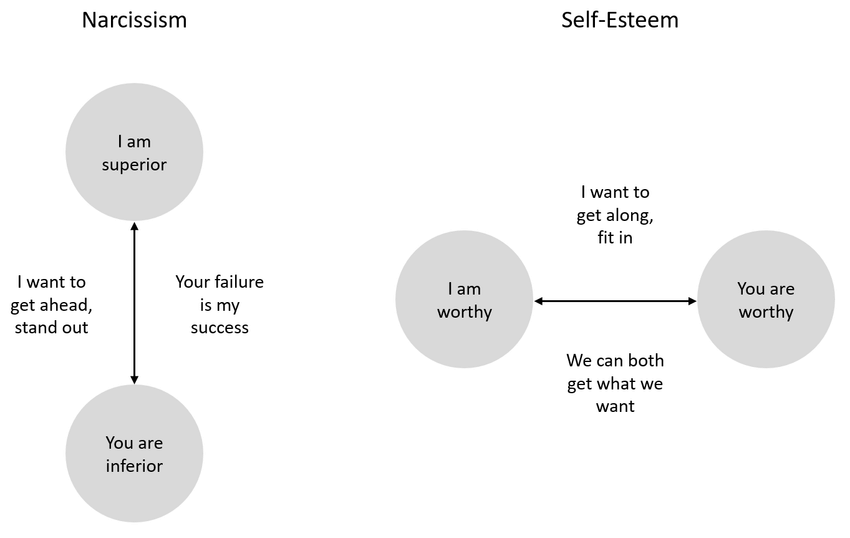
These affected entertain the (false) belief they can compartmentalize their narcissistic behavior and direct it only at the narcissist. In other words, they trust in their ability to segregate their behavior patterns: verbally abusive towards the narcissist - civil with others, act with malice where the narcissist is concerned - and with Christian charity towards all others.
They cling to the "faucet theory". They believe that they can turn on and off their negative feelings, their abusive outbursts, their vindictiveness and vengefulness, their blind rage, their non-discriminating judgment. This, of course, is untrue. These behaviors spill over, into daily transactions with innocent others.
One cannot be partly or temporarily vindictive and judgmental any more than one can be partly or temporarily pregnant. To their horror, these victims discover that they have been transmuted and transformed into their worst nightmare: into a narcissist.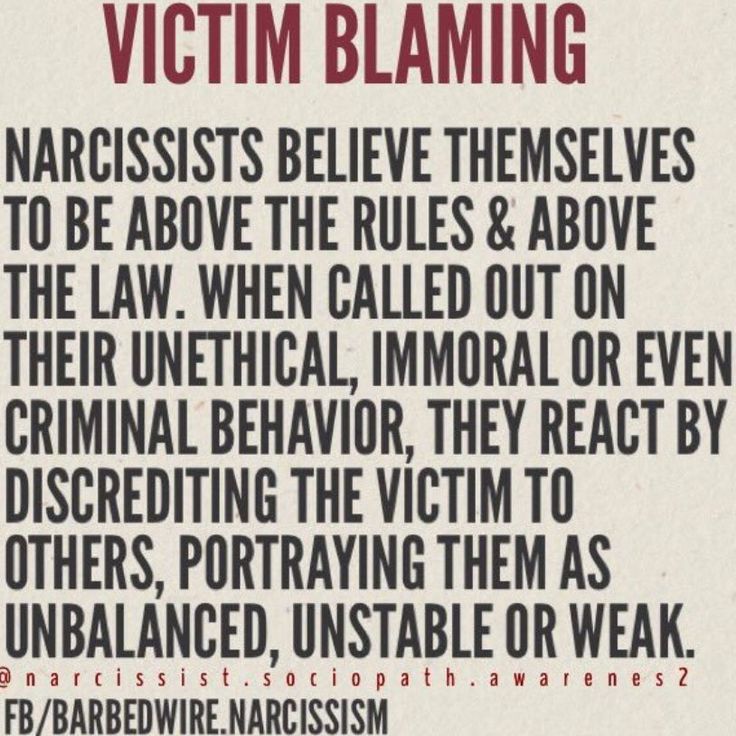
Narcissism is contagious and that many victims tend to become narcissists themselves: malevolent, vicious, lacking empathy, egotistical, exploitative, violent and abusive.
next: Narcissistic Signal, Stimulus, and Hibernation Mini-Cycles
APA Reference
Staff, H. (2008, November 19). Narcissism By Proxy, HealthyPlace. Retrieved on 2022, December 30 from https://www.healthyplace.com/personality-disorders/malignant-self-love/narcissism-by-proxy
Committing Narcissism by Proxy | Psychology Today
Visit any family-oriented restaurant in an upscale neighborhood, and you will probably observe children obviously accustomed to being put on display by smiling, openly doting parents. These children speak loudly and have the attitude of royalty. The parents treat each youthful utterance or action as a profound offering from on high. No effort is made by the parent to restore a sense of modest restraint.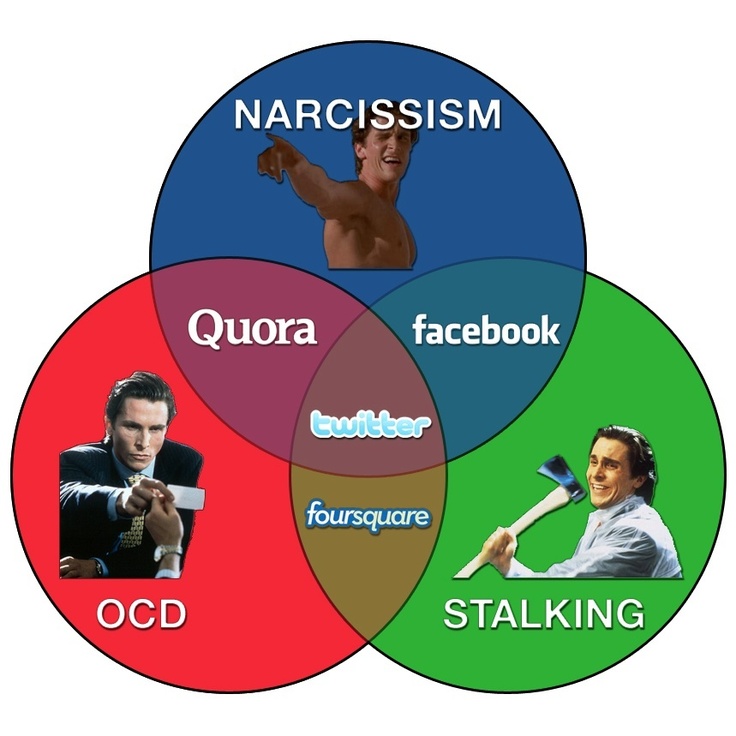 As a clinical psychologist interested in the negative effects of narcissistic parenting, this parental exhibitionism seizes my attention. I wonder, “Are these parents narcissists?” and “What will be the outcome for the children?”
As a clinical psychologist interested in the negative effects of narcissistic parenting, this parental exhibitionism seizes my attention. I wonder, “Are these parents narcissists?” and “What will be the outcome for the children?”
The first question seems easier to answer. According to the Diagnostic and Statistical Manual of Mental Disorders, 5th Edition (American Psychiatric Association, 2013), up to 6.2% of the general population may meet the diagnostic criteria for Narcissistic Personality Disorder. Even allowing that many people exhibit various narcissistic traits without meeting full diagnostic criteria, the sheer ubiquity of this style of modern parenting seems at odds with the notion that these (overly) proud parents share a psychological disorder. In short, this phenomenon is far too common for all of these parents to be narcissists, but they certainly appear to treat their children as if narcissistic personae by proxy.
True narcissists are especially sensitive and vulnerable to experiences capable of eliciting a sense of shameful deflation or inadequacy. In some respects, the entire personality structure develops as a means to keep shame at arm’s length. The narcissist spends considerable time in grandiose fantasy states in which he or she imagines being admired, alternating with fleeting, rapid transitions to bitter, angry states in response to perceived unjust criticism or lack of acknowledgment. The narcissistic personality is thus hostage to the need for self-enhancement at the expense of the ability to care for or pay attention to others. In the case of truly narcissistic parents, self-absorption and lack of empathy deprive the child of needed attention and affection. Periodically (e.g., at graduations, family gatherings or public events), the child might briefly be put on display as an object for parental self-enhancement, but the narcissistic parent is unable to tolerate sustained diversion of attention to the child. For the narcissist, attention is a crucial commodity in a zero-sum game.
In some respects, the entire personality structure develops as a means to keep shame at arm’s length. The narcissist spends considerable time in grandiose fantasy states in which he or she imagines being admired, alternating with fleeting, rapid transitions to bitter, angry states in response to perceived unjust criticism or lack of acknowledgment. The narcissistic personality is thus hostage to the need for self-enhancement at the expense of the ability to care for or pay attention to others. In the case of truly narcissistic parents, self-absorption and lack of empathy deprive the child of needed attention and affection. Periodically (e.g., at graduations, family gatherings or public events), the child might briefly be put on display as an object for parental self-enhancement, but the narcissistic parent is unable to tolerate sustained diversion of attention to the child. For the narcissist, attention is a crucial commodity in a zero-sum game.
Of course, contrary to being neglected, the children that I observe are suffused with parental attention.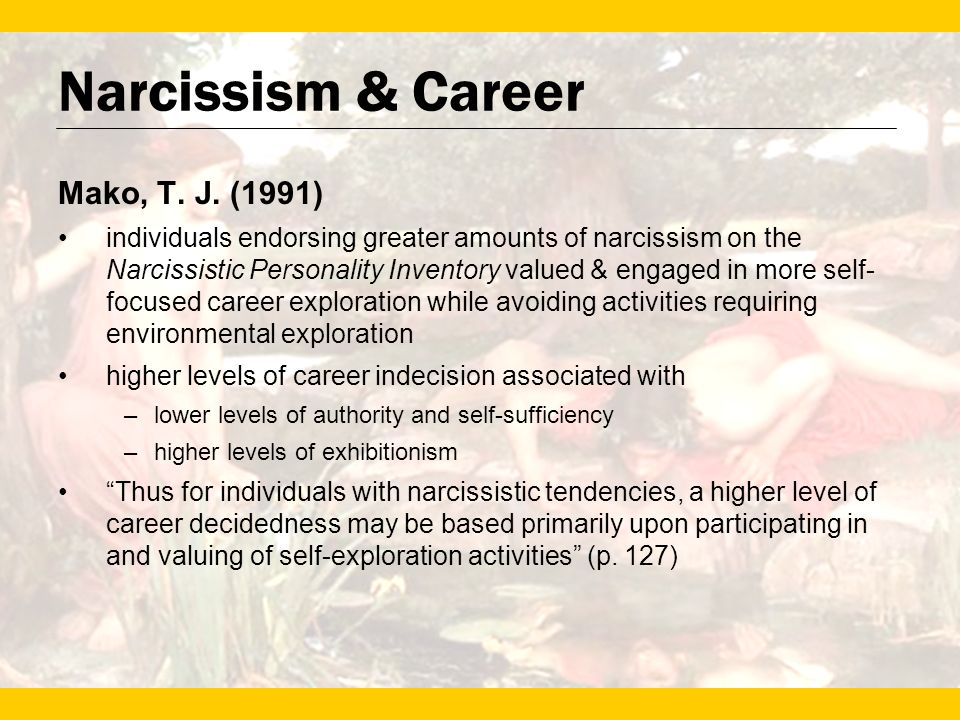 If these (generally married, often from upper socioeconomic classes) parents are not clinically narcissists, this modern style of permissive, exhibitionistic parenting can only be evidence of an emerging social phenomenon. At the larger cultural level, society is developing a new relationship with emotions in general and shame in particular. From the introduction of vague but dramatic figures of speech (“I’m like;” “that’s crazy”) to the currency of boastful but empty on-line posts, social media has hijacked our very ability to carefully analyze our experiences or communicate clearly about them. It is hard to overstate the degree to which continual on-line connection to sources of instant self-referential feedback, with the means to inspire envious attention from others, has warped the collective psyche. Emphasizing the underlining of subjective feeling states and downgrading objective analysis, social media is defining new norms about how we understand or announce our existence. More and more, it seems to be our immediate feelings that define us.
If these (generally married, often from upper socioeconomic classes) parents are not clinically narcissists, this modern style of permissive, exhibitionistic parenting can only be evidence of an emerging social phenomenon. At the larger cultural level, society is developing a new relationship with emotions in general and shame in particular. From the introduction of vague but dramatic figures of speech (“I’m like;” “that’s crazy”) to the currency of boastful but empty on-line posts, social media has hijacked our very ability to carefully analyze our experiences or communicate clearly about them. It is hard to overstate the degree to which continual on-line connection to sources of instant self-referential feedback, with the means to inspire envious attention from others, has warped the collective psyche. Emphasizing the underlining of subjective feeling states and downgrading objective analysis, social media is defining new norms about how we understand or announce our existence. More and more, it seems to be our immediate feelings that define us.
Against this backdrop of conspicuous sentimentality, unconditional love for the child has come to overwhelm any critical awareness of a child’s true impact on other people. It feels “shaming” to notice or focus on a child’s very normal but off-putting traits, such as aggression, hostility, selfishness or entitlement. As traditional moral prohibitions are tossed aside in our enlightened ethos, our very culture has grown defiant of shame. Behaviors or attitudes formerly meeting with disapproval are now seen emerging from the oppressive shadow of arbitrary shunning into the sunlight of understanding. In addition to progress and tolerance, this movement can lead to chaos and confusion. The only remaining “authentic” guiding truth is commitment to heartfelt enthusiasms proudly proclaimed.
In this culture of online announcements and exhibitionistic displays of virtue, children become convenient, socially sanctioned receptacles for the projection of split-off, idealized aspects of the parental self.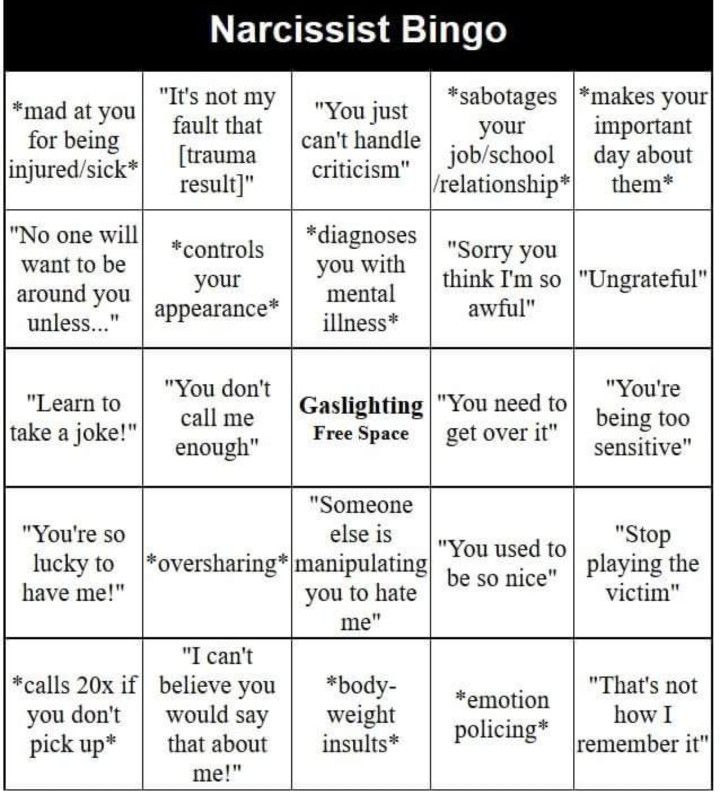 It is as if shame is an emotion from which children (and by extension, their parents) must be protected. From this viewpoint, children embody authenticity unsullied by regressive societal forces. Even parents who would be loath to boast about themselves now risk becoming cheerleaders for their “perfect” children, unconsciously promoting a child’s display of cringeworthy hubris and entitlement. We seem to have lost the idea that responsible parenting requires reining in these qualities.
It is as if shame is an emotion from which children (and by extension, their parents) must be protected. From this viewpoint, children embody authenticity unsullied by regressive societal forces. Even parents who would be loath to boast about themselves now risk becoming cheerleaders for their “perfect” children, unconsciously promoting a child’s display of cringeworthy hubris and entitlement. We seem to have lost the idea that responsible parenting requires reining in these qualities.
There is thus a growing moral prohibition against the necessary limit setting or authoritarian aspects of parenting, now seen as “harsh” or “mean.” The modern parent is increasingly restricted to use of only praise or indulgence for fear of alienating the child or injuring self-esteem. This despite empirical research showing that high self-esteem is actually negatively correlated with success, mature compassion for others or optimal functioning in adulthood (Bushman & Baumeister, 1998).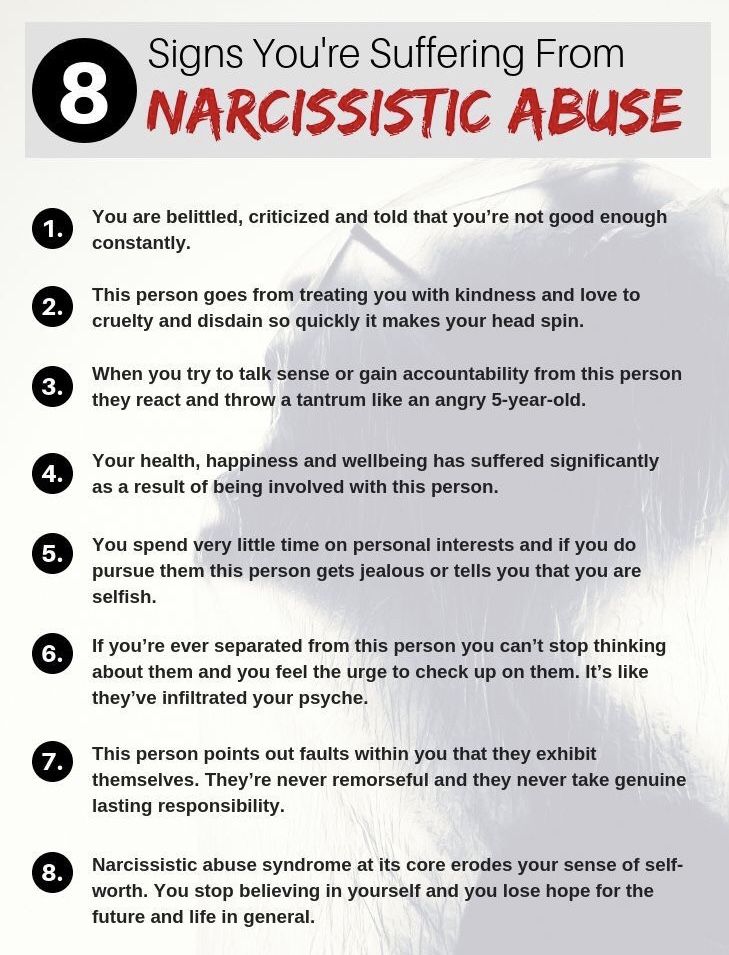
We may already be seeing the effects of simultaneously permissive, over-identified, parents. In the past several years, college campuses have become home to “safe spaces,” the theme of which seems to be that students need protection, not only (appropriately) from physical threat, but also from exposure even to ideas or their proponents with which they disagree. Interestingly, while these students are reporting higher levels of self-esteem than in prior decades (Twenge & Campbell, 2009), we are simultaneously seeing what has been described as “mental health crisis” among our college students, who report increasing levels of depression, stress, and alienation (Lukianoff & Haidt, 2018). It seems that current parenting practices do not prepare young people to adapt to a real-world replete with disappointment and frustration. The modern parent may unwittingly be promoting vulnerability to anxiety and depression rather than resiliency in the face of adversity.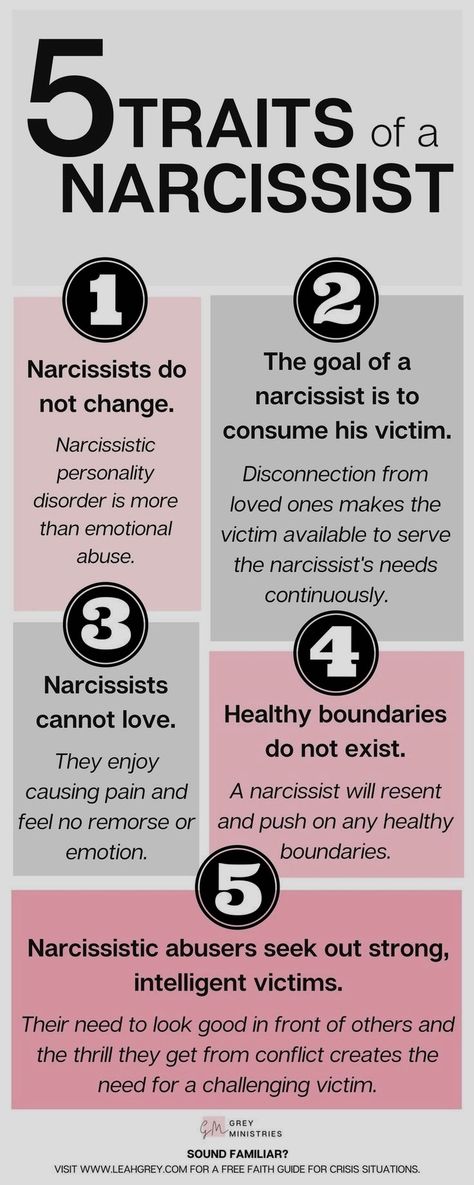
A parent need not be a narcissist to want the best for their child, to see and encourage the best within him or her, and to defend against undue criticism. These biases are baked into human nature through evolution, biology and shared family histories. As the culture shifts, the challenge for a modern parent is to balance these natural instincts with proper limit setting, acting as an authority figure rather than a friend or approving peer. Children come into the world with what Freud termed “infantile narcissism,” a developmentally primitive understanding of the world as emanating from an expansive sense of the experiencing self as everything. Traditionally, parents helped socialize children by confronting and containing these traits. It remains to be seen what happens as our very culture begins to define children primarily as extensions of idealized parental virtue, perfect as they are, requiring no traditional forms of criticism or correction. I continue to wonder what types of parents these children will turn out to be.
Sam Vaknin. Narcissism By Proxy
Some survivors of narcissistic abuse assume the role and posture of a martyr, a "professional" victim. In doing so, they become self-centered, empathetic, cruel exploiters. In other words, they become narcissists.
Question: Is narcissism "contagious"? Is it possible to "pick up" narcissism by living with a narcissist?
Answer: The psychiatric profession uses the word "epidemiology" to describe the predominant psychopathologies. There is some merit in researching the coverage of personality disorders in a general population. Mental health is the tangible outcome of the subtle interplay between environment and upbringing, genetics and culture, the brain, maturation and socialization. But are personality disorders contagious? The answer is more complex than a simple yes or no. nine0003
Personality disorders are not contagious in a limited, strictly medical sense. They are not transmitted by pathogens from one individual to another.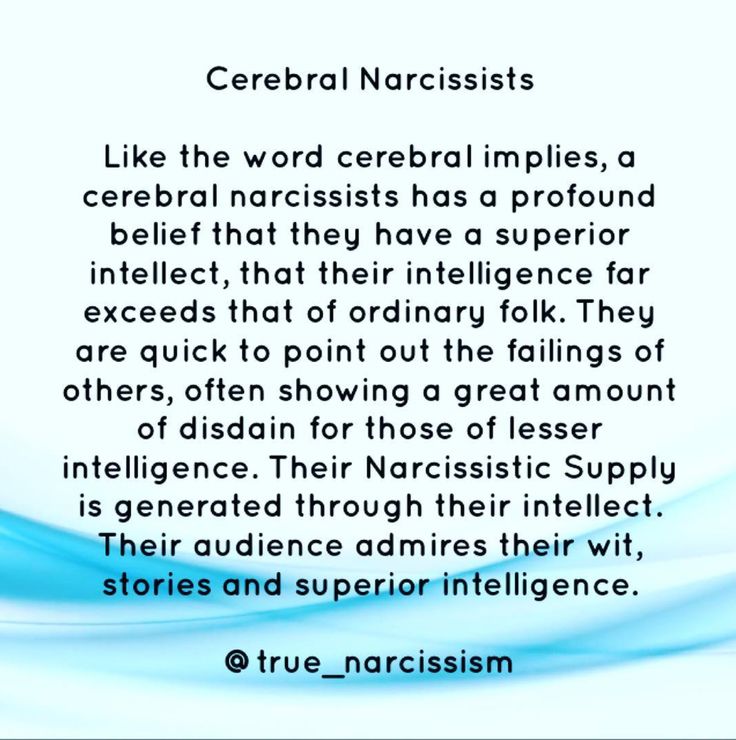 They are deprived of many of the main features of physio-biological epidemics. However, they are transmitted.
They are deprived of many of the main features of physio-biological epidemics. However, they are transmitted.
First, there is direct, interpersonal influence. A chance encounter with a narcissist is likely to leave a bad aftertaste, confusion, pain, or anger. But these fleeting reactions do not have a lasting effect and fade away over time. The situation is different with longer-term interactions: marriage, partnership, cohabitation, joint work or study, and so on. nine0003
Narcissus waves it off. Our reactions to the narcissist—at first ridicule, occasionally anger or frustration—tend to accumulate and form a defective sediment. Gradually, the narcissist distorts those personalities with whom he is in constant contact, draws them into his painful mycelium, redirects and suppresses them. After successful cloning, the narcissist uses the people he has damaged as narcissistic mediators, as narcissistic mechanisms for mediated narcissism.
The narcissist awakens in us emotions that are mostly negative and unpleasant.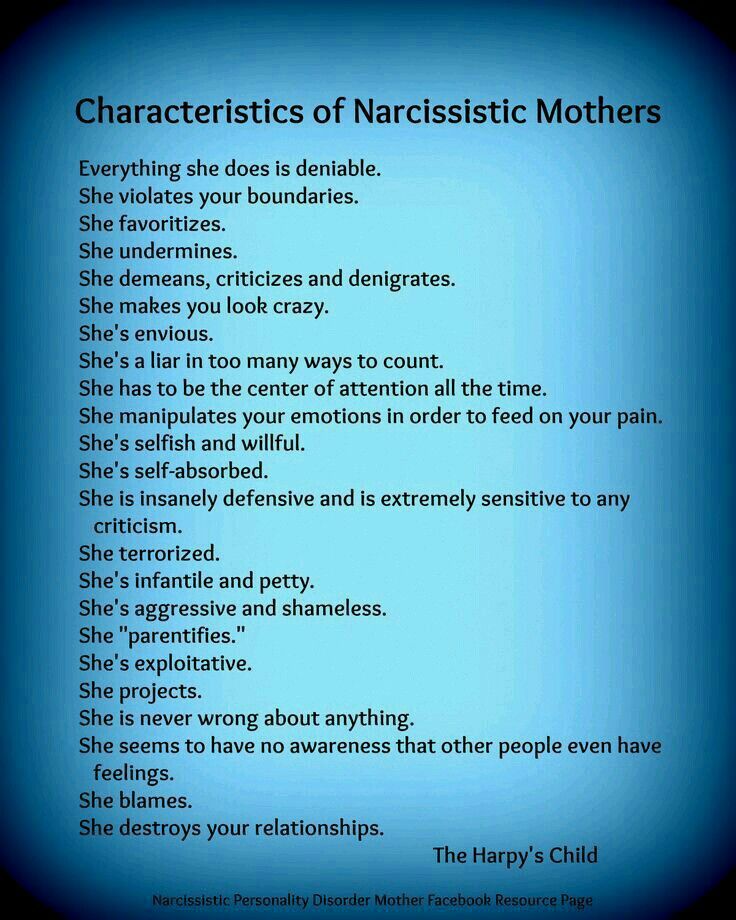 The initial reaction, as we have already said, is most likely mockery. The narcissist is pompous, incredibly self-centered, falsely grandiose, festering and eccentric (even in his manner of speech he tends to be stilted and archaic), often elicits smirks instead of adoration. But the entertainment value is rapidly declining. The narcissist's behavior becomes annoying, annoying, and burdensome. Smiles are replaced by anger, and then undisguised rage. The narcissist's inadequacies are so blatant, and his and his denial and other defense mechanisms so primitive, that we continually find ourselves yelling at him, rebuking him, or even hitting him, literally and figuratively. nine0003
The initial reaction, as we have already said, is most likely mockery. The narcissist is pompous, incredibly self-centered, falsely grandiose, festering and eccentric (even in his manner of speech he tends to be stilted and archaic), often elicits smirks instead of adoration. But the entertainment value is rapidly declining. The narcissist's behavior becomes annoying, annoying, and burdensome. Smiles are replaced by anger, and then undisguised rage. The narcissist's inadequacies are so blatant, and his and his denial and other defense mechanisms so primitive, that we continually find ourselves yelling at him, rebuking him, or even hitting him, literally and figuratively. nine0003
Ashamed of such reactions, we also begin to feel guilty. We find ourselves tied to a mental pendulum swinging between disgust and guilt, rage and regret, devoid of empathy and conscience.
Smoothly we assimilate the very characteristics of the narcissist that we have lamented so much about. We become just as tactless as he is, just as lacking the ability to empathize and show courtesy, just as ignorant of other people's emotional make-up, and just as narrow-minded.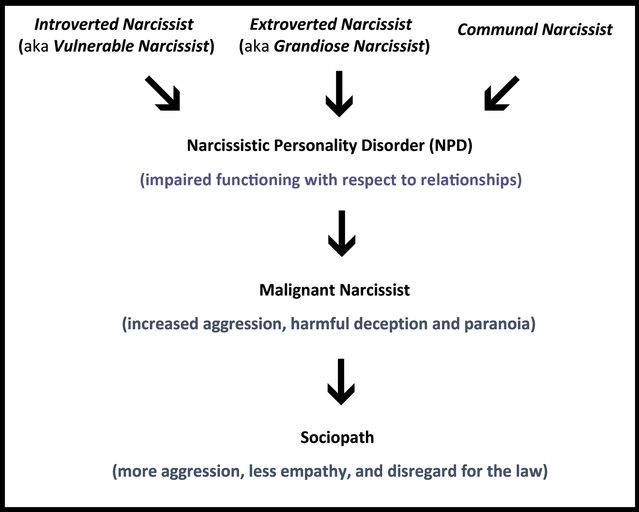 nine0003
nine0003
After being exposed to the painful halo of the narcissist, we are "infected". The narcissist invades our personality. He forces us to respond in the way he might want to if he has the audacity or understanding (a mechanism known as "projective identification"). We are exhausted by his eccentricity, his grandiosity, his constant special purpose. The narcissist constantly, categorically and even aggressively makes demands on his human environment. He is tied to Narcissistic Supply: praise, adoration, acceptance, attention. He forces others to lie to him and overestimate his achievements, talents and merits. Living in a narcissistic fiction, he forces his family and friends to join him. The resultant exhaustion, despair and weakening of the will are at the complete disposal of the narcissist. It penetrates this weakened defense and, like a Trojan horse, "injects" its deadly charge even deeper. Gradually, all those who are close to him find themselves imitating and emulating his personality traits.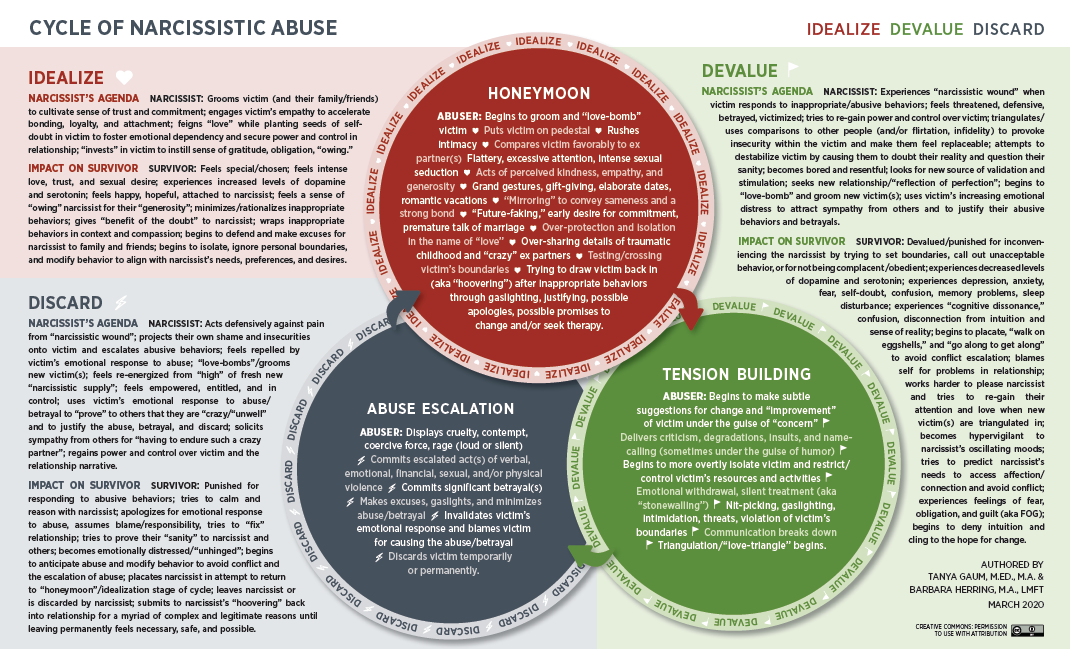 nine0003
nine0003
The narcissist also does not hesitate to intimidate them into agreeing to his commands. The narcissist coerces the people around him by subtly using processes like reinforcement and conditioning. Trying to avoid unpleasant consequences from not fulfilling his desires, people are more likely to tolerate his requests and indulge his whims. In order not to meet his terrifying fury, they "cut corners", pretend, participate in his charades, lies, and become involved in his grandiose fantasies.
Rather than endure aggressive chicanery, they "shrink" and shrink their personalities. By doing all this, they deceive themselves by saying that they have avoided the worst consequences. But the worst is yet to come.
The narcissist is limited, constrained, held back and overwhelmed by the special structures of his personality and his disorder. There are many types of behavior that are unacceptable to him, many reactions and actions are "forbidden", many desires are stifled, many fears are invincible. The narcissist uses those around him as an outlet for all these repressed emotional and behavioral patterns. Having penetrated their personalities, altered them through friction and erosion, made them compatible with his own disorder, ensured the submission of his victims, he seeks to occupy their shells. nine0003
The narcissist uses those around him as an outlet for all these repressed emotional and behavioral patterns. Having penetrated their personalities, altered them through friction and erosion, made them compatible with his own disorder, ensured the submission of his victims, he seeks to occupy their shells. nine0003
Then he forces them to do what he himself has always dreamed of, what he has often longed for, what he has always been afraid to do. Using the same coercive procedures, he pushes his buddies, spouse, partners, colleagues, children, and co-workers to cooperate in expressing the repressed side of his personality. At the same time, he denies their vague suspicion that in doing these acts, their identity is being replaced by his.
The narcissist can thus extract (compensatory, through other people's lives) the much desired Narcissistic Resource. He recruits criminal, romantic, or heroic motives into his zombie army. He forces them to travel far and fast, breaking all the rules, playing all-in, fearing no one - in short: he transforms them into something that he himself could never be.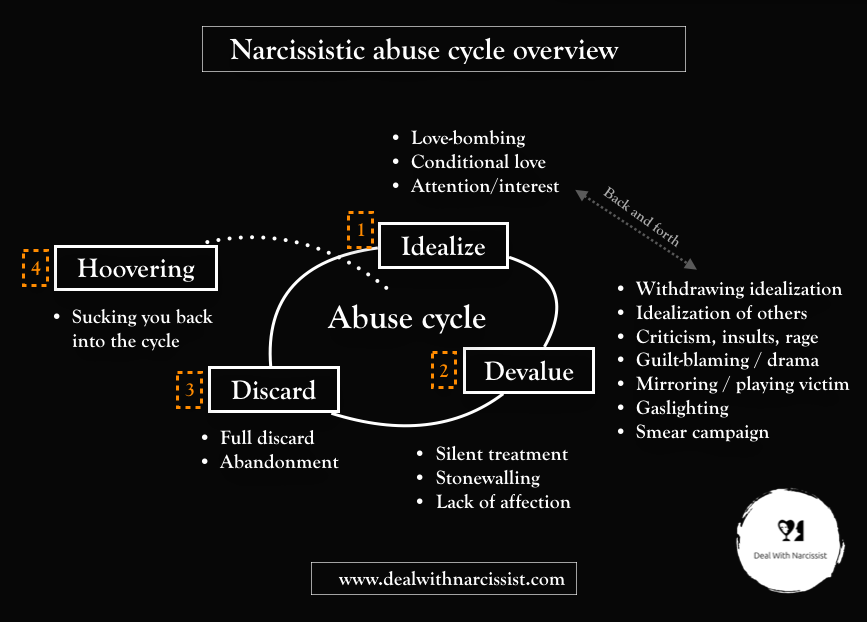 nine0003
nine0003
The narcissist craves attention, delight, amazement; otherwise, horrific reactions are erupted on the heads of his attorneys. He consumes the Narcissistic Supply flowing through these human aqueducts of his own design. Such a narcissist tends to use phrases like "I created him", "He was nothing before he met me", "He is my creation", "She learned everything she knows from me and at my expense", and so on.
Sufficiently detached - both emotionally and legally - the narcissist flees the scene of the crime when things get tough. Often, these behaviors, actions, and emotions caused by mediation with a narcissist lead to severe consequences. Emotional or legal crisis, physical or material disaster are common outcomes of playing narcissistic cards. nine0003
The narcissist's victim is not equipped to deal with the crises that make up the narcissist's daily ration, and which he or she is now forced to confront by narcissistic proxy. The behavior and emotions assigned by the narcissist are alien and the victim experiences cognitive dissonance.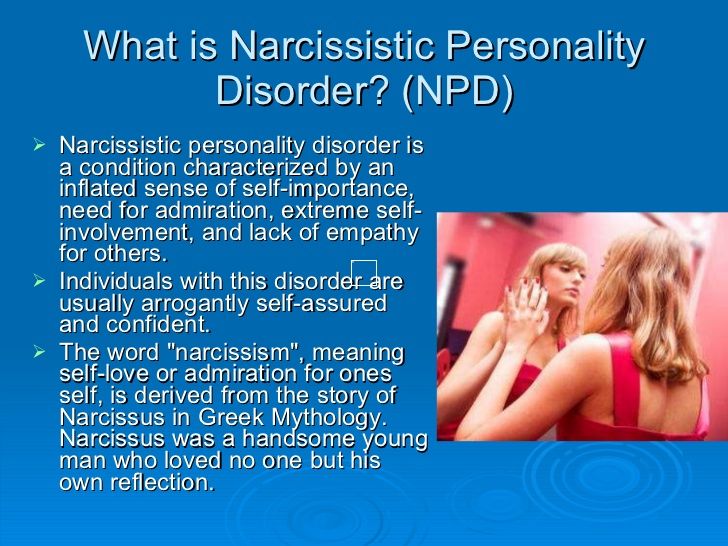
This only makes things worse. But the narcissist is rarely left to watch his clones writhe and suffer. At the first sign of danger, he disappears. This act of dissolution does not necessarily take place physically or geographically. The narcissist is indeed adept at emotional disappearance and escape from moral and legal responsibility (despite his constant self-justifying moralizing). And it is there and then that his family and inner circle reveal his true nature: he uses and discounts people easily and unceremoniously. For him, people are either "functional" and "useful" in his pursuit of Narcissistic Supply, or they are not. But in both cases, they are not people, but objects, or just cartoons. Of all the pains the narcissist inflicts, this harsh and contemptuous dismissal is probably the most intense and painful. nine0003
When Victims Become Narcissists
The interaction between the narcissist (or psychopath) and his victim is not explicitly delineated.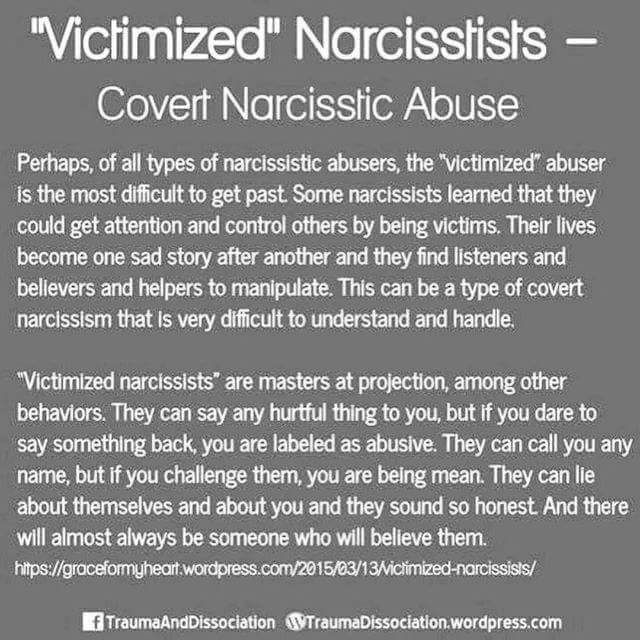 Many victims deploy narcissistic defenses, are narcissistically hurt, and become enraged just like narcissists. They succumb to their aggressors primarily because they like to be the center of attention and make sure of their own uniqueness. The narcissist is good at ways to get his victims to behave in this way. After, when the victims are devalued and abandoned, they receive nagging narcissistic wounds and react with undisguised malice. nine0003
Many victims deploy narcissistic defenses, are narcissistically hurt, and become enraged just like narcissists. They succumb to their aggressors primarily because they like to be the center of attention and make sure of their own uniqueness. The narcissist is good at ways to get his victims to behave in this way. After, when the victims are devalued and abandoned, they receive nagging narcissistic wounds and react with undisguised malice. nine0003
Some take on the role of professional victim. In doing so, they become self-centered, empathetic, cruel exploiters. In other words, they become narcissists. The role of "professional victims" - people whose existence and even their very identity rests only on their sacrifice - has been well studied by victimology. These studies are not pleasant reading. These "pro" victims are often more violent, vindictive, caustic, devoid of compassion, and destructive than their aggressors. They make this a career. They identify with this role to the exclusion of everything else. This danger must be avoided. And that's exactly what I call "The Narcissistic Microbe" or "Narcissism By Proxy". nine0003
This danger must be avoided. And that's exactly what I call "The Narcissistic Microbe" or "Narcissism By Proxy". nine0003
The infected have the (false) illusion that they can isolate their narcissistic behavior and direct it exclusively towards the narcissist. In other words, they trust their ability to isolate control of themselves and be both aggressive towards the narcissist and civilized and compassionate towards others, acting with malice towards the narcissist and with Christian mercy towards all others.
They cling to the "valve theory". They believe they can turn their negative feelings on and off, their aggressive outbursts, their vindictiveness and revanchism, their blind rage, their indiscriminate judgment. This, of course, is not true. These patterns of behavior flow through daily activities, towards innocent neighbors, colleagues, family members, employees or customers. nine0003
No one can be partially or temporarily vindictive and critical, just as one cannot be partially pregnant.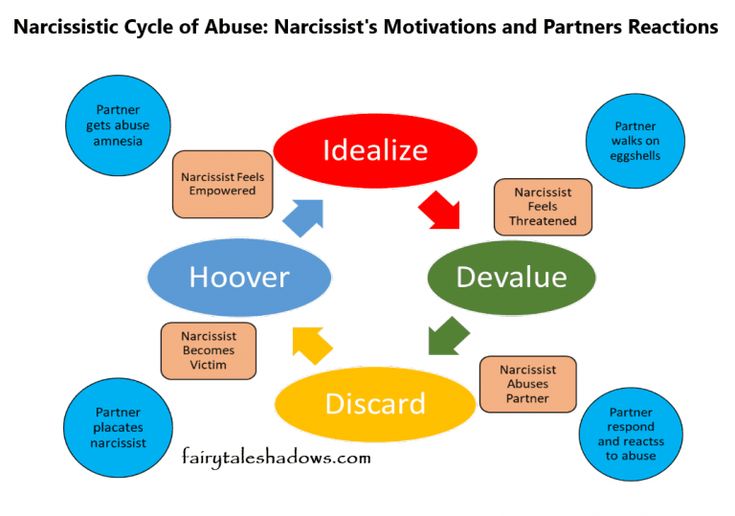 To their horror, these victims discover that they have mutated and transformed into their worst nightmare: a narcissist. At this price, they discover the truth that narcissism is contagious, and many victims tend to become narcissists themselves: vicious, vicious, lacking empathy, selfish, exploitative, destructive, and cruel.
To their horror, these victims discover that they have mutated and transformed into their worst nightmare: a narcissist. At this price, they discover the truth that narcissism is contagious, and many victims tend to become narcissists themselves: vicious, vicious, lacking empathy, selfish, exploitative, destructive, and cruel.
Sam Vaknin
Original article in English: Narcissism by Proxy
Translation: Shutov Yu.G.
Tags: Sam Vaknin, narcissism, codependency
Narcissistic parents
For the narcissist, the child is the fulfillment of all dreams, but only in the most selfish sense
Sam Vaknin is the author of Malignant Self-Love, Narcissism Revisited, "After the Rain - How the West Lost the East", and many other (paper and electronic) publications on topics from psychology, relations, philosophy, economics and international relations. He has been a correspondent for Central Europe Review, Global Politician, PopMatters, eBookWeb and Bellaonline, and as Chief Business Correspondent for United Press International (UPI). He has also been the category editor for mental health and East Central Europe for The Open Directory and Suite101. nine0072
How does a narcissistic mother behave?
She takes care of her child's physical health, she can send him to different clubs and sections, dress him nicely, but she knows nothing about his inner world and his needs. Who he is, what he is and what he wants - this interests her the least. She herself knows everything for him, because she perceives him as an extension of herself.
What is the influence of narcissistic parents on their children? nine0080
At the risk of oversimplification, I would say that narcissism tends to feed narcissism - but only a small proportion of children of narcissistic parents become narcissists. This may be due to genetic predispositions or other life circumstances (for example, not being the firstborn).
But MOST narcissists have a parent or guardian who is a narcissist.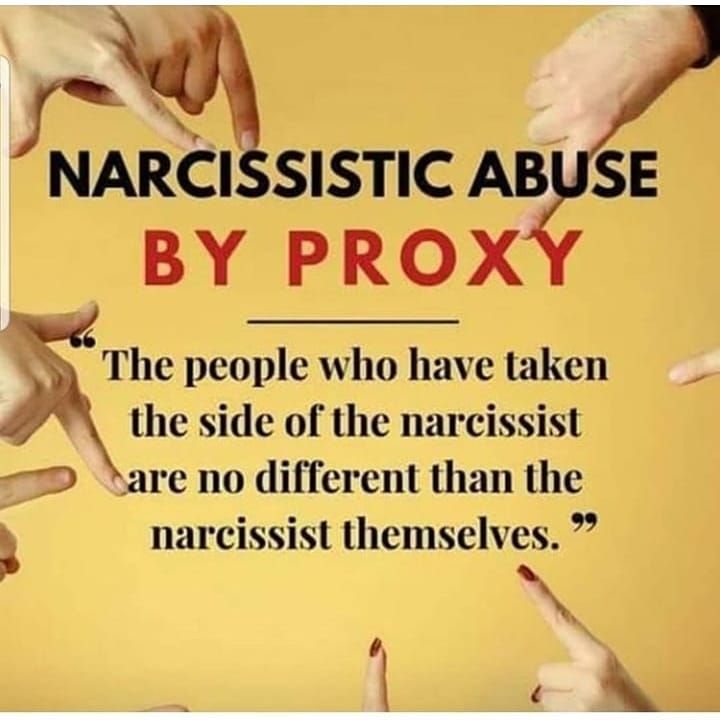
The narcissistic parent sees in his child a multifaceted Source of Narcissistic Supply. The child is considered an extension of the narcissist. And it is through the child that the narcissist tries to bill the world. The child is destined to fulfill the unfulfilled dreams, desires and fantasies of the narcissistic parent. nine0003
Such a "life by proxy" can develop in two ways: the narcissist can either merge with his child, or be indifferent to him.
Indifference is the result of a conflict between the narcissistic desire to achieve his narcissistic goals through the child and his pathological (destructive) envy of the child and his achievements.
To alleviate the heaviness imposed by such emotional duality, the narcissistic parent resorts to thousands of control mechanisms. They can be grouped like this:
- driven by guilt (“I sacrificed my life for you”),
- codependent ("I need you, I can't live without you"),
- goal-oriented ("We have a common goal that we must achieve"),
- general psychosis and emotional incest (“You and I stand up to the whole world, or at least your monstrous, bad father”, “You are my one and only true love and passion”),
- explicit ("If you do not accept my principles, beliefs, ideology, religion, values, if you do not obey my instructions, I will punish you").
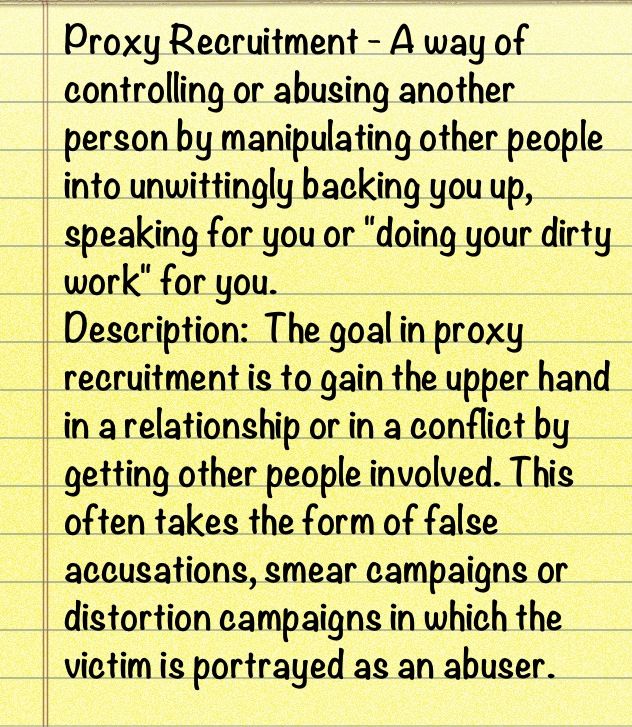 nine0106
nine0106
This exercise in control helps maintain the illusion that the child is part of the narcissist. But maintaining the illusion requires an extraordinary level of control (on the part of the parent) and obedience (on the part of the child).
These relationships are usually symbiotic and emotionally explosive. The child performs another important narcissistic function - providing a Narcissistic Supply.
It is impossible not to notice the alleged (albeit imagined) immortality in the fact of having children. The child's early (natural) dependence on his caregivers acts as an alleviation of his fear of abandonment. The narcissist attempts to prolong this addiction by using the above mechanisms of control. nine0003
The child is the ultimate Secondary Source of Narcissistic Supply. He is always there, he adores the daffodil, he is a witness to the moments of his triumph and greatness. Because of his desire to be loved, constant giving can be extorted from a child.
For the narcissist, the child is the fulfillment of all dreams, but only in the most selfish sense. When a child demonstrates a "renunciation" of his main function (providing constant attention to his narcissistic parent), the parent's emotional reaction is severe and accusatory. It is when a narcissistic parent is disappointed in their child that we can see the real nature of this pathological relationship. The child is fully reified. The narcissist reacts to the violation of this unwritten contract with a fair amount of aggression and aggressive transformations: contempt, rage, emotional, psychological and even physical abuse. He is trying to destroy the real "recalcitrant" child and replace him with a submissive, trained, previous version of him. nine0003
What are the most common ways a mother's narcissism can affect her daughter's relationships?
It depends on how narcissistic her mother is.
Narcissistic parents fail to recognize and accept the personal independence and boundaries of their offspring.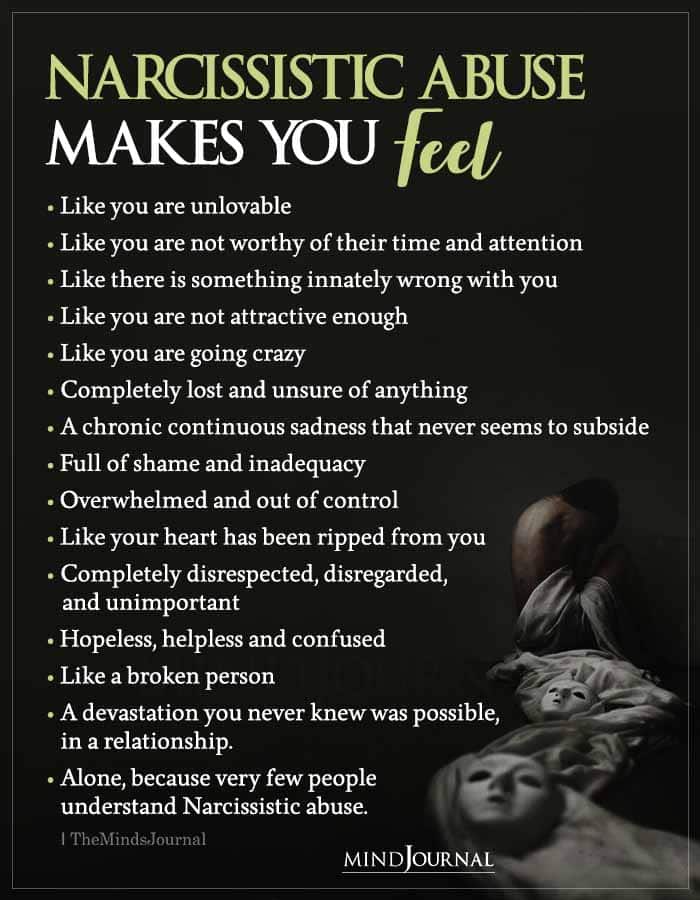 They see them as instruments of their reward or extensions of themselves. Their love is based on the "quality" of their children and how well they meet the parent's needs, desires, and priorities. nine0003
They see them as instruments of their reward or extensions of themselves. Their love is based on the "quality" of their children and how well they meet the parent's needs, desires, and priorities. nine0003
Consequently, narcissistic parents alternate between sticky emotional blackmail (when they seek the child's attention), flattery and compliance (known as Narcissistic Supply) with harsh discounting and boycott (when they want to punish the child for refusing to follow the rules).
Such inconstancy and unpredictability make the child insecure and dependent.
Entering into adult relationships, such children feel:
- that they must “earn” every crumb of love; nine0106
- that they will be permanently and easily abandoned unless they are quite "up to standard";
- that their main role is to "take care" of their spouse, boyfriend, partner or friend;
- that they are less important, less valuable, less skillful, and less deserving than others significant to them.
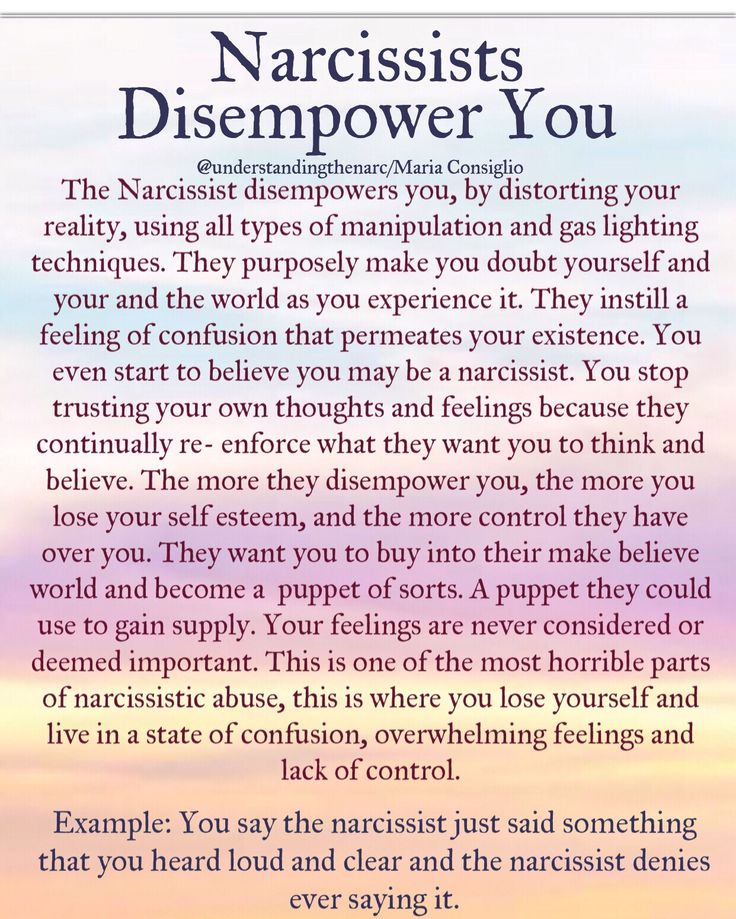
What is most important when daughters of narcissistic mothers start a relationship? When does this relationship go on? When does this relationship end? nine0080
The child of narcissistic parents is morbidly adjusted; his personality is inflexible and subject to the development of psychological defense mechanisms. That is, in their relationships, they demonstrate the same behavior, from beginning to end, and regardless of changing circumstances.
As adults, offspring of narcissists tend to prolong pathological primary relationships (with their narcissistic parents). They depend on other people for emotional support and ego functioning, and for daily activities in general. nine0003
They are needy, demanding and humble. They fear abandonment, are clingy, and display immature behavior in their attempts to maintain a "relationship" with their companion or friend on whom they depend.
No matter how much abuse they get, they stay in the relationship.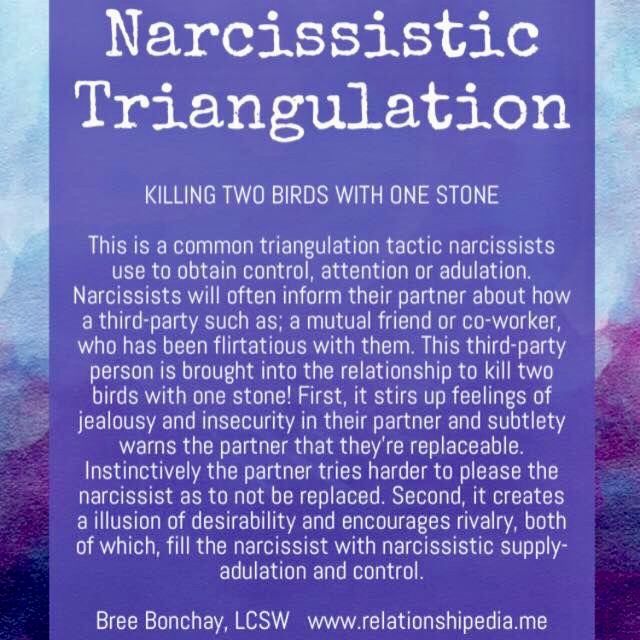 By willingly accepting the role of victim, codependents crave control over their perpetrators. Some of them become Inverted Narcissists, also referred to as "covert narcissists", these are co-dependents who are completely dependent on narcissists (narcissistic addicts). nine0003
By willingly accepting the role of victim, codependents crave control over their perpetrators. Some of them become Inverted Narcissists, also referred to as "covert narcissists", these are co-dependents who are completely dependent on narcissists (narcissistic addicts). nine0003
If you live with a narcissist, are in a relationship with him, are married to him, are married to him, work with a narcissist, etc. - this does NOT mean that you are an inverted narcissist. In order to be an inverted narcissist, you must Cling to the relationship with the narcissist, no matter how much abuse he/she inflicts on you. You must ACTIVELY seek a relationship with a narcissist and ONLY with a narcissist, no matter what your (bitter and traumatic) past experiences are. You must feel EMPTINESS and UNHAPPINESS with ANY OTHER personality type. Only then, and if you meet the other diagnostic criteria for Dependent Personality Disorder, can you truly be called a Narcissist Inverted. nine0003
A small minority become counter-dependent and narcissistic, emulating and imitating the traits and behavior of their parents. These children's emotions, narcissistic feelings and needs are buried under "scars" formed, fused and hardened by years of some form of abuse.
These children's emotions, narcissistic feelings and needs are buried under "scars" formed, fused and hardened by years of some form of abuse.
Magnificence, a sense of importance, lack of empathy (empathy) and over the top arrogance usually hide a gnawing sense of insecurity and fluctuating self-esteem.
Counterdependents are stubborn (reject and disregard authority), rigidly independent, egocentric, dominant and aggressive. They fear intimacy and are caught in cycles of indecisive intimacy followed by commitment avoidance. They are "lone wolves" and are bad as team players. nine0003
Counterdependence is a reactive formation. The counter-addict judges his own weaknesses. He tries to overcome them by projecting an image of omniscience, omnipotence, success, self-sufficiency and superiority.
How do narcissistic mothers influence and participate in their daughters' intimate/married life? What does it look like compared to ordinary mothers?
The narcissistic mother suffers from control mania, she hardly leaves the good old sources of Narcissistic Supply (admiration, praise, attention of any kind).